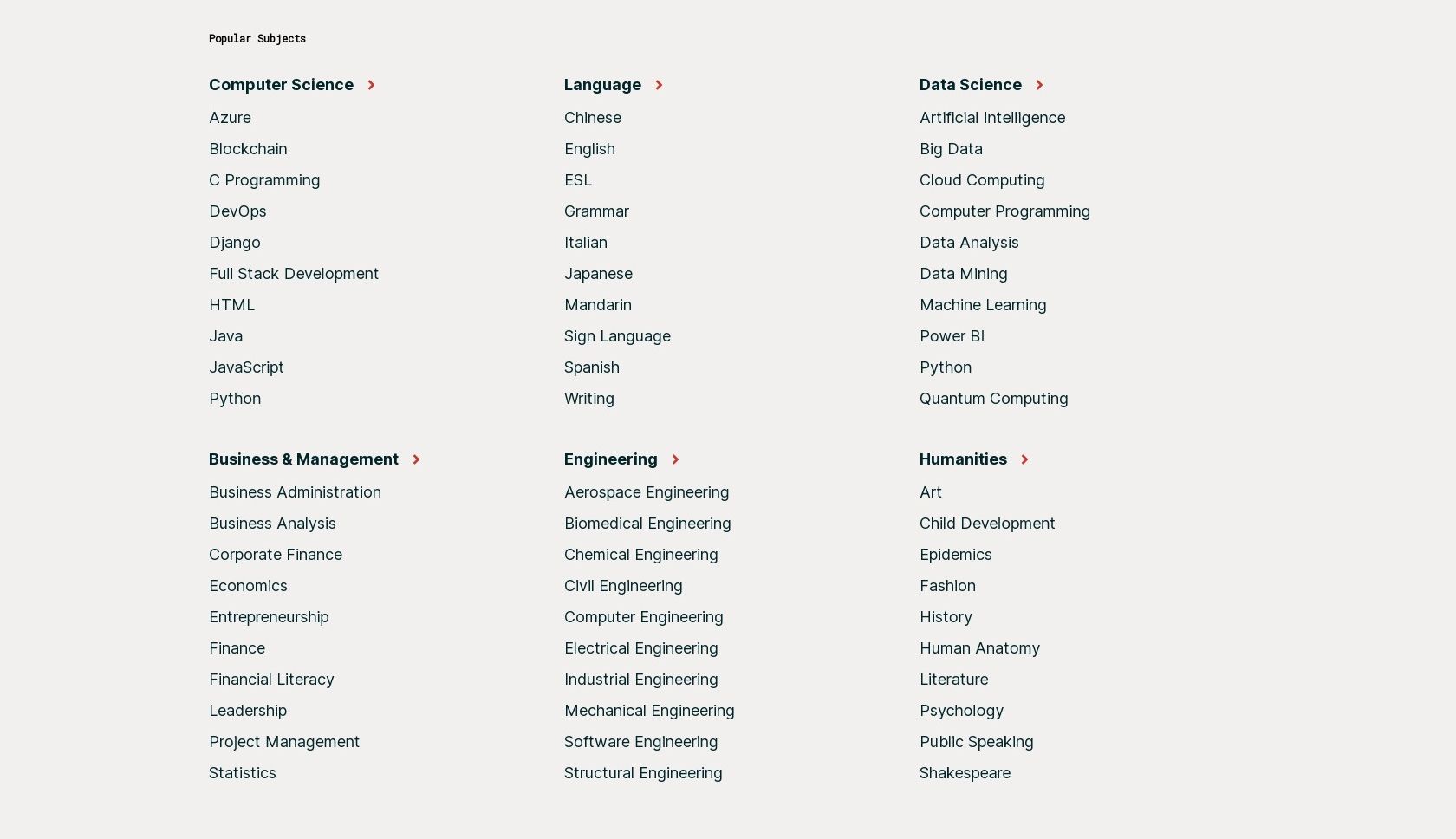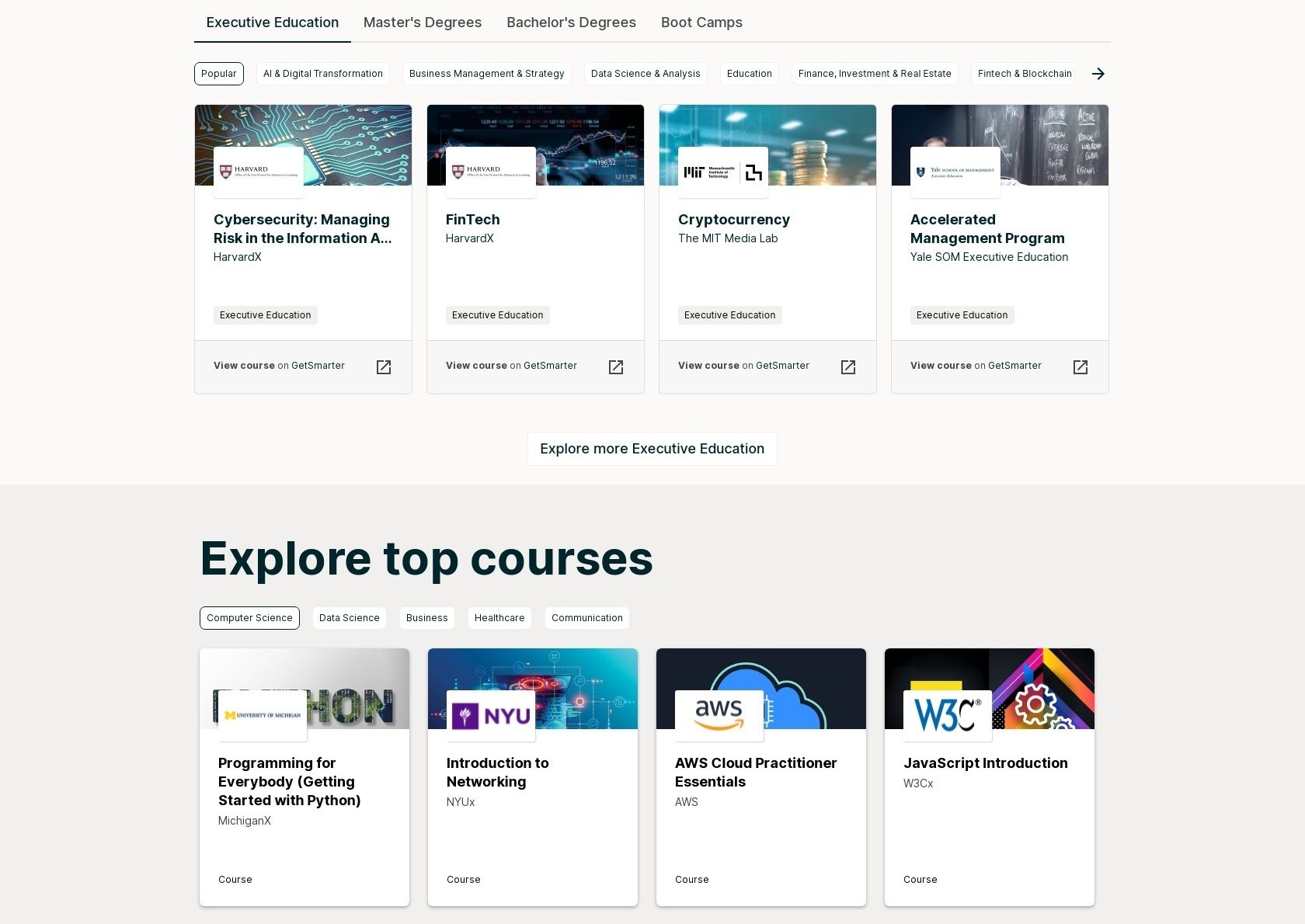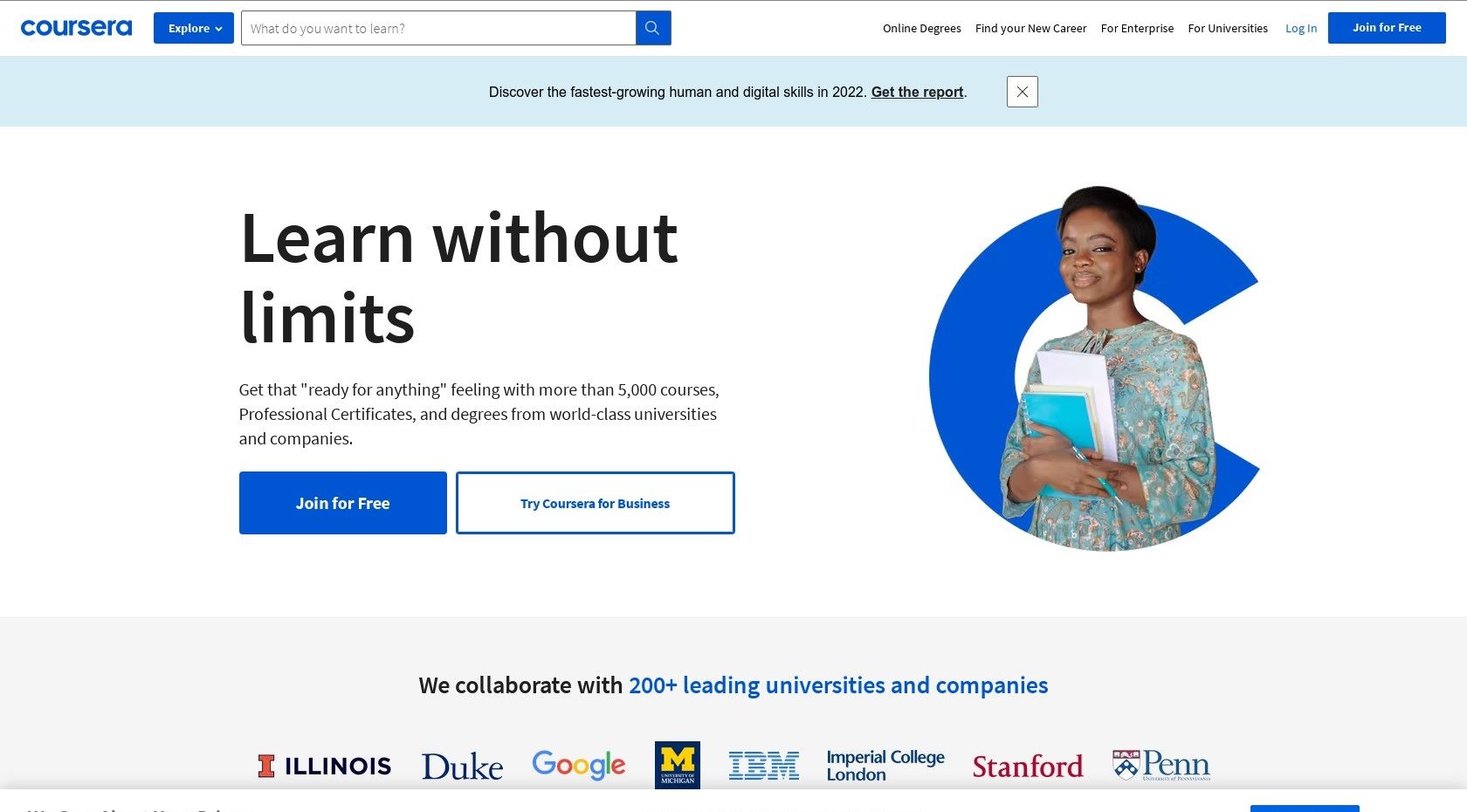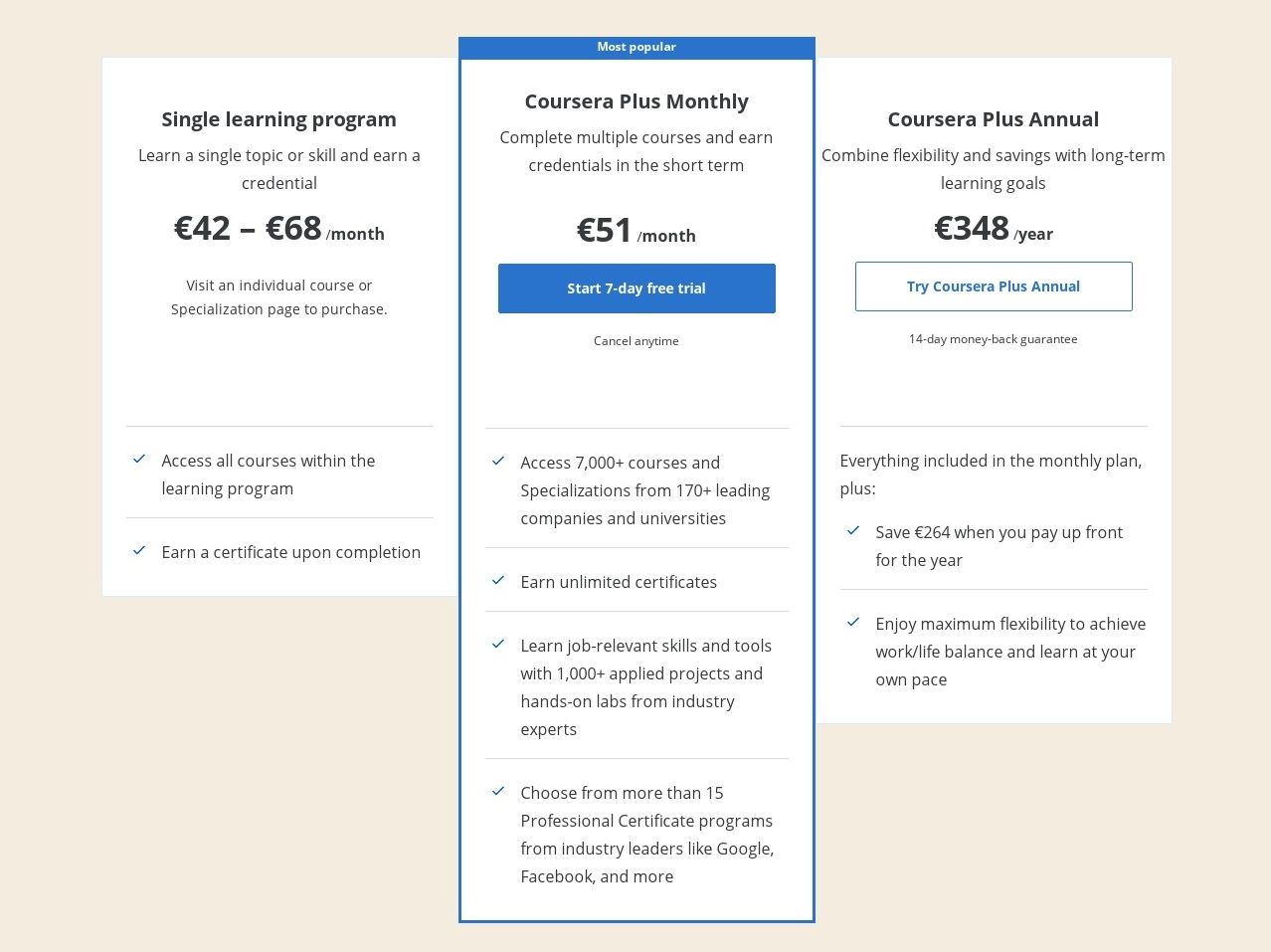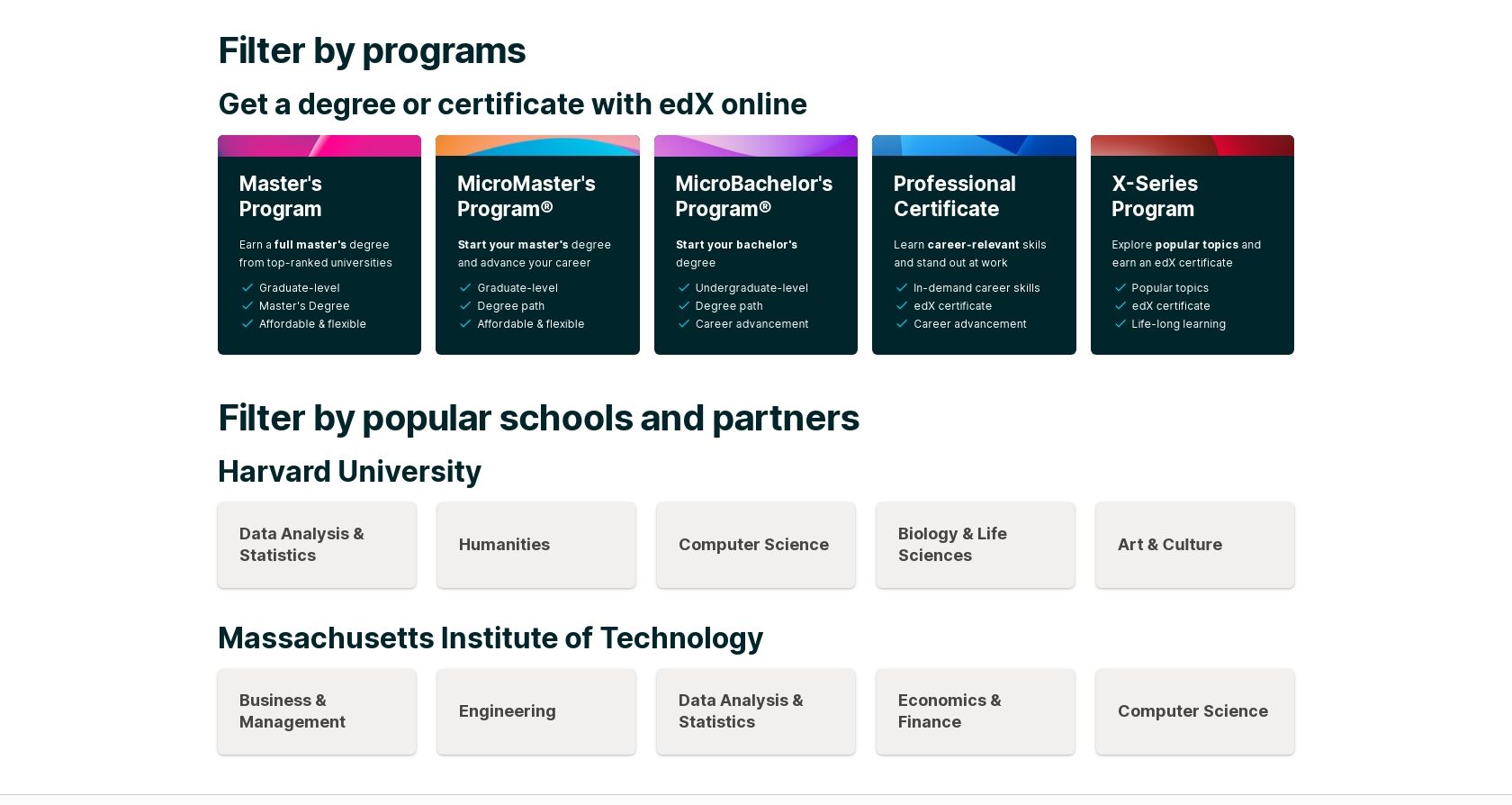edX and Coursera are among the largest online learning platforms on the internet. Both platforms offer high-quality courses and are renowned for their collaboration with prestigious educational institutions around the world.Although both platforms are similar in a lot of ways, there are enough differences between them to impact your learning experience on either platform.So, edX vs Coursera, which is the best for you? Let's take a look.
edX and Coursera's Learning Experiences
The value you get from a course is impacted by your learning experience. edX and Coursera put a lot of work into building a pleasant learning experience. To gauge which platform offers a better learning experience, we weighed both platforms using three metrics.
1. User Interface
edX and Coursera have a beautiful and intuitive user interface. However, it's easier to find your way around Coursera than edX. Coursera's user interface is simpler and more intuitive. You see things where you expect them to be, making navigation effortless. Coursera's mobile site is also a big plus.
edX on the other end does a good job of keeping its "core learning" pages light with little to no distracting items. This is very important for a distraction-free learning experience. Nonetheless, looking at the bigger picture, Coursera wins on the user interface metric.
2. User Experience
Although both platforms offer in-course discussion channels, you'll find Coursera's communication channels to be more interactive and responsive. Coursera's live chat feature is also a big plus.
Due to bureaucracy within partner institutions, it sometimes takes a lot of time to get issues resolved on edX. This can be a morale killer at times. Coursera isn't exactly a role model in this regard, but things move faster. On this metric, Coursera wins.
3. Learning Ambience
edX mirrors a lot of the components of a traditional university environment. From the way the curriculum is structured to the delivery of lectures. It is as close to a typical university as you can get.
Coursera adopts a similar approach, but with courses running at a slightly faster pace. As compared to edX, Coursera courses employ a more skill-oriented approach towards learning. On this metric, we'll call it a tie.
Winner: Coursera
The Courses Offered on edX and Coursera
edX and Coursera boast a massive collection of courses spanning topics in technology, arts, personal development, language studies, and several others. They are one of the best places to access quality college-level courses.
1. Number of Courses and Niches Covered
The edX website lists around 3,500 courses. Coursera on the other hand offers around 7,000 courses. However, the numbers do not tell the whole story.
edX may have fewer courses, but the platform covers more subjects areas. Conversely, Coursera covers fewer subjects (or niches) but has more courses.
In terms of the sheer number of available courses, Coursera wins. However, edX covers significantly more subjects areas than Coursera.
2. Standout or Popular Courses
While Coursera is renowned for its computer-related courses, it has a less talked about strength—business courses! Coursera lists more than 1000 high-quality business courses.
If you want access to a large array of skill-oriented business-related courses, you'll have a better chance with Coursera. However, while Coursera wins the quantity battle, edX provides slightly better quality.
It's safe to say both platforms excel at technology and business courses.
There's one key point to note. Most of Coursera's non-tech courses are typically very tech-centric. So, if you are taking a business or health course, for example, you should expect to be taught from a tech-centric perspective.
Although edX follows a similar model, there is a bolder alienation between tech and other subject areas.
Winner: it's a tie.
Does edX or Coursera Offer a Better Quality of Courses?
In terms of quality, edX and Coursera offer some of the best courses among the most popular e-learning platforms. Both platform field courses that are curated by some of the best universities and organizations around the world.
You'll find courses from reputable universities like Princeton, Stanford, and Yale on Coursera. On edX, you'll get courses curated by MIT, IBM, and several Ivy League universities.
Courses on both platforms are vetted by industry experts and are frequently updated and reviewed for quality. However, edX marginally edges out Coursera in terms of quality.
When sampling a wide range of courses on both platforms, you'll find edX courses to be better designed to impact value. This doesn't in any way make Coursera's courses less worthy. The advantage is marginal at best.
Winner: edX.
Quality of Instructors on edX and Coursera
Online courses are as good as the instructors or tutors that deliver them. A course with juicy content but poor delivery is a poor course, period. Fortunately, both edX and Coursera understand this.
On both platforms, you'll find some of the best instructors in the world—typically brandishing a Ph.D. or two, with years of experience to their name.
The standards on both platforms are high. You'll find very little to fault on both sides. The competition is too close to call.
Winner: It's a tie.
edX and Coursera's Enrollment and Pricing Options
Deciding which platform is better in terms of pricing is tricky. You'll notice a wide price variation between courses. However, from a holistic point of view, Coursera offers better pricing options. Why?
edX courses cost between $50 and $100 (for individual courses). While Coursera courses typically hover around the same price range, a lot of their courses are heavily discounted.
This means you can frequently get courses at $29 or less instead of maybe $80 or more. Apart from Coursera's discounts, the Coursera Plus plan is a huge money saver. Instead of paying $80 for a single course, you can pay $399 for year-long access to thousands of Coursera courses.
However, Coursera's pricing advantage is eroded when it comes to degree-awarding programs. On both platforms, you should expect to spend around $9000 for some degrees.
In terms of enrollment options, both platforms have an "audit course" feature that gives users free access to courses. However, this option doesn't offer certifications after completing a course.
Also, on both platforms, when you audit a course, you'll have free access to most of the course materials but won't be able to participate in graded assignments. Here are some great Coursera courses you can enroll right away for free.
However, Coursera has other enrollment options like applying for financial aid. With this option, you can apply for financial aid or scholarship for most of Coursera's courses.
If approved, you'll be able to complete the selected course with no limitations, and get certified free of charge. edX has a financial aid option as well, but you'll get a discount rather than fully funded assistance.
Winner: Coursera.
Which Degrees and Certifications Do edX and Coursera Offer?
If you need a degree or certification for the courses you enroll in, you'll want to make sure those degrees are worth more than the paper they're written on. Coursera and edX fit that profile. Their affiliation with reputable universities gives their certifications valuable backing. However, there's more to it.
edX has more clear-cut ways to make the best use of your certifications. If you school at any of the partner institutions, some programs on edX can count as credits towards completing your diploma.
If you play your cards well, you can earn a recognized degree without ever entering a physical school campus. Coursera doesn't exactly lack these options. The ways to achieve it are just too obscure.
In terms of degree and certification, edX takes it.
Winner: edX.
When to Use Coursera
- If you need access to a larger variety of courses within each subject area, then Coursera is your best bet.
- If you need more fast-paced courses to help you learn skills at a faster pace
- If you want to take a lot of courses at a subsidized rate
When to Use edX
- If you want to take a lot of courses across different fields
- If you want to earn credits towards completing a degree
- If you want the best real-world university experience from the comfort of your home
The Verdict: Coursera vs. edX
This is a very close race, with both platforms only outdoing each other marginally on almost all metrics. It is two wins for edX, two for Coursera, and two ties.
As the results show, both platforms are very similar in quality. The real winners of this comparison are the millions of learners who get to access Ivy League education—same courses, same professors—from edX or Coursera.


.jpeg)
